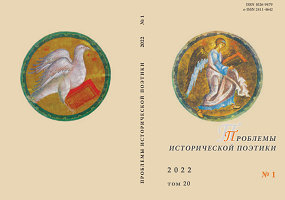Учительство и проповедь в первой напечатанной повести Н. В. Гоголя («Бисаврюк, или Вечер накануне Ивана Купала», 1830)
Teaching and Preaching in the First Printed Short Novel (‘Povest’) by Nikolai Gogol (“Bisavryuk, or The Evening on the Eve of Ivan Kupala”, 1830)
Author(s): Igor’ A. VinogradovSubject(s): Customs / Folklore, Russian Literature, Cultural Anthropology / Ethnology, 19th Century, Eastern Orthodoxy
Published by: Петрозаводский государственный университет
Keywords: Nikolai Gogol; biography; creativity; author’s intention; interpretations; romanticism; folklorism; ethnography; realism; historicism; style; pseudonym; narrator’s image; literary mask; alter ego;
Summary/Abstract: One of the “key” works of Gogol’s heritage is analyzed — the first prose work that appeared in print, the short novel (‘povest’) “Bisavryuk, or The Evening on the Eve of Ivan Kupala” (1830). Gogol’s literary debut in prose is a key work in the sense that it opens the door to understanding the writer’s subsequent work. Based on numerous facts, it is established that since his very first steps in literature, Gogol played the role of a conscious spiritual mentor and preacher. His first prose work (Gogol began as the author of the poems “Italy” and “Gantz Kuchelgarten”) is a sort of literary ekphrasis, which is centered around the theme of spiritual discipline. The short novel (‘povest’) is “theology in images,” and the clergyman, a representative of the common man’s milieu, a rural deacon (church reader, psalm reader), on whose behalf the story is narrated, becomes the author’s alter ego. For the first time, an analytical comparison of two editions of “Evening on the Eve of Ivan Kupala” was undertaken: the original journal version on one side and the subsequent one included in the “Evenings on a Farm near Dikanka” collection (the first edition of the short novel (‘povest’) was called “Bisavryuk, or Evening on the Eve of Ivan Kupala”; in the second, Gogol dropped the beginning of the title, leaving only the second part, “Evening on the Eve of Ivan Kupala”). The comparison shows that the first edition is more frank in expressing the religious views of the author than the second one. In the second edition, Gogol tempered the excessive edification and categorical nature of the original version. It is emphasized that as early as in this short novel (‘povest’), Gogol separates himself from superstitions and “childish prejudices” inherent in popular consciousness and focuses his talent on exposing those phenomena that have survived in the public, folk life from the pagan era. As a faithful ethnographer, a deep connoisseur of folk psychology and folklore, in the first short novel (‘povest’), contrary to the widespread interpretations of his work in radical criticism, the writer already appears not only as an original writer of everyday life, but also an astute thinker and theologian, like his predecessor, St. Tikhon of Zadonsk. From the first “Little Russian” short novel (‘povest’) one can guess many features of the future creator of “Dead Souls”, “Selected Passages from Correspondence with Friends”, and “Reflections on the Divine Liturgy”.
Journal: Проблемы исторической поэтики
- Issue Year: 20/2022
- Issue No: 1
- Page Range: 54-109
- Page Count: 56
- Language: Russian

